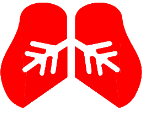
Asthma is a chronic disease involving the airways in the lungs. These airways allow air to come in and out of the lungs.
If you have asthma your airways are inflamed. They become even more swollen and the muscles around the airways can tighten when something triggers your symptoms. This makes it difficult for air to move in and out of the lungs, causing symptoms such as coughing, wheezing, shortness of breath and/or chest tightness.
People with a family history of allergies or asthma are more prone to developing asthma. Many people with asthma also have allergies. This is called allergic asthma.
Childhood asthma impacts millions of children and their families. In fact, the majority of children who develop asthma do so before the age of five.
There is no cure for asthma, but once it is properly diagnosed and a treatment plan is in place you will be able to manage your condition, and your quality of life will improve.
Asthma Symptoms
The most common symptom is wheezing. This is a scratchy or whistling sound when you breathe. Other symptoms include:
• Shortness of breath
• Chest tightness or pain
• Chronic coughing
• Trouble sleeping due to coughing or wheezing
Asthma symptoms, also called asthma flare-ups or asthma attacks, are often caused by allergies and exposure to allergens such as pet dander, dust mites, pollen or mold. Non-allergic triggers include smoke, pollution or cold air or changes in weather.
Asthma symptoms may be worse during exercise, when you have a cold or during times of high stress.
If your child has one or more of these common symptoms, make an appointment with an allergist / immunologist:
• Coughing that is constant or that is made worse by viral infections, happens while your child is asleep, or is triggered by exercise and cold air
• Wheezing or whistling sound when your child exhales
• Shortness of breath or rapid breathing, which may be associated with exercise
• Chest tightness (a young child may say that his chest “hurts” or “feels funny”)
• Fatigue (your child may slow down or stop playing)
• Problems feeding or grunting during feeding (infants)
• Avoiding sports or social activities
• Problems sleeping due to coughing or difficulty breathing
Patterns in asthma symptoms are important and can help your doctor make a diagnosis. Pay attention to when symptoms occur:
• At night or early morning
• During or after exercise
• During certain seasons
• After laughing or crying
• When exposed to common asthma triggers
Asthma Diagnosis
An allergist diagnoses asthma by taking a thorough medical history and performing breathing tests to measure how well your lungs work.
